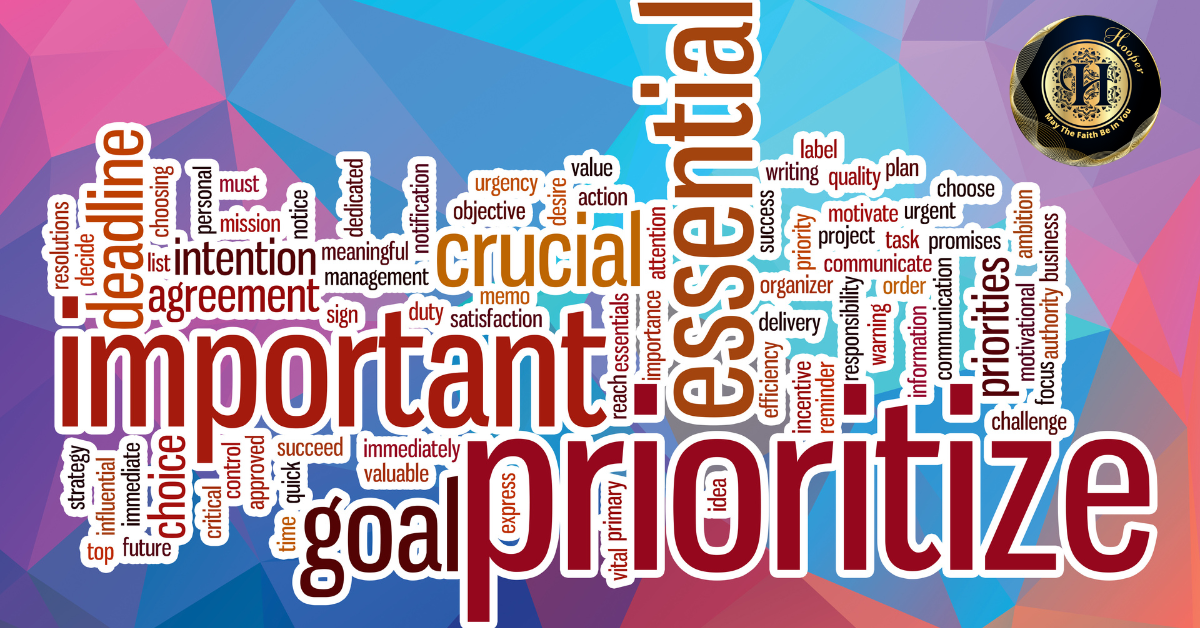In our fast-paced world, it’s easy to get caught up in the whirlwind of daily demands and distractions. However, one of the most crucial steps toward achieving a fulfilling and stable life is establishing and managing both financial and emotional priorities. Setting the right priorities can make life run more smoothly, help you handle difficult times, and even prevent those tough times from occurring in the first place. Here’s why it’s crucial to get your priorities straight and how to go about it effectively.
1. Creating a Roadmap for Success
When you establish clear priorities, you create a roadmap that guides your decisions and actions. This not only helps you stay focused on your goals but also prevents you from getting sidetracked by less important things. The benefits of this sense of direction are significant in both the financial and emotional aspects of life.
a. Example: Think of packing for a vacation. Suppose you carefully plan and pack ahead of time. In that case, you are more likely to have everything you need, reducing the chances of forgetting essential items. While you may still need to pick up something during your trip, it will likely be minor and less expensive than if you packed carelessly at the last minute. Poor planning can lead to unnecessary stress and extra costs, which could have been avoided with thoughtful preparation.
2. Financial Stability: A Cornerstone of Peace
Financial Stability is foundational for a stress-free life. By prioritizing your finances, you ensure that you have the resources to meet your needs and handle unexpected expenses. Here’s how to do it:
a. Budgeting Wisely: Create a realistic budget that covers your essential expenses and allows for savings. Stick to this budget and avoid the temptation to overspend on non-essentials. This doesn’t mean you shouldn’t spend on things that make you happy. Of course, you should, as these things add to your quality of life. The key is striking a balance and being willing to set a limit on non-essentials.
b. Saving for Emergencies: Set aside a portion of your income for an emergency fund. This fund will be your safety net in case of unexpected financial challenges.
c. Avoiding Debt: While it’s sometimes necessary to take on debt, such as for a mortgage or education, be cautious about accumulating debt for material possessions that are beyond your means. High debt levels can lead to financial stress and limit your future opportunities.
3. Emotional Priorities: Nurturing Your Well-being
Just as important as financial Stability is emotional well-being. Establishing emotional priorities means recognizing what truly matters to you and making time for those things. Here are some tips:
a. Building Relationships: Invest time and effort in building strong relationships with family and friends. These connections provide emotional support and enrich your life.
b. Self-Care: Prioritize activities that nurture your physical and mental health, such as exercise, hobbies, and relaxation. Taking care of yourself is essential for overall well-being.
c. Pursuing Passions: Make time for activities that bring you joy and fulfillment. Whether it’s a creative hobby, volunteering, or learning something new, engaging in what you love enhances your emotional health.
d. Honest Self-Reflection: Have an honest conversation with yourself about where you are now and where you want to be. Are you wandering through life and accepting whatever it gives you, or do you have a plan that puts you in control of your destiny? Reflecting on your current state and future goals can provide clarity and help you set meaningful priorities, fostering a sense of introspection and thoughtful decision-making.
4. Preventing Difficult Times
By managing your financial and emotional priorities, you can prevent many difficult times before they arise. Financially, having a budget and an emergency fund can shield you from crises like unexpected medical bills or job loss. Emotionally, strong relationships and self-care routines build resilience and help you cope with stress more effectively.
5. Establishing Stability
Stability in life doesn’t mean avoiding all risks or challenges but rather having the foundation to navigate them successfully. Financial Stability allows you to plan for the future and take advantage of opportunities without the constant worry of making ends meet. Emotional Stability provides a sense of balance and contentment, allowing you to face life’s ups and downs gracefully.
6. The Perils of Chasing Material Gains
In a society that often equates success with material wealth, it’s easy to fall into the trap of chasing after things that don’t truly matter. Accumulating possessions beyond your budget can lead to financial strain and detract from what’s genuinely important. Instead of focusing on material gains, invest in experiences and relationships that bring lasting joy and fulfillment.
7. What If I Live Paycheck to Paycheck?
It may not seem possible to put money into a savings account when you live paycheck to paycheck, but you can do some things. Sometimes, you live paycheck to paycheck because you spend too much on non-essential things. Review every single monthly expense to find potential savings. Are you eating out too much? Do you really need both cable and Netflix? Are you leaving the lights on unnecessarily? Could you cut the gym membership and exercise at the local park instead? Small adjustments can add up and help you build a more secure financial foundation.
8. The Importance of Insurance
Health, life, and final expense insurance should be integral to your financial plan. These insurances provide significant relief to your family and loved ones when needed:
a. Health Insurance: Ensures that you can afford medical care without incurring substantial debt. Knowing that you and your family can receive the necessary treatments without financial strain provides peace of mind.
b. Life Insurance: Provides financial support to your dependents in case of your untimely death. It can help cover funeral costs, pay off debts, and provide for ongoing living expenses, ensuring your family’s financial security.
c. Final Expense Insurance: Specifically covers the cost of your funeral and other related expenses. This prevents your family from bearing the financial burden during an already emotionally challenging time.
Conclusion:
Establishing and managing financial and emotional priorities is essential for a balanced and fulfilling life. By setting the right priorities, you can create Stability, prevent difficulties, and confidently navigate life’s challenges. Remember, the true measure of success isn’t in the things you own but in the quality of your life and the relationships you nurture. Take the time to reflect on what matters most to you and make conscious decisions that align with those values. Your future self will thank you.
With clarity and purpose,












